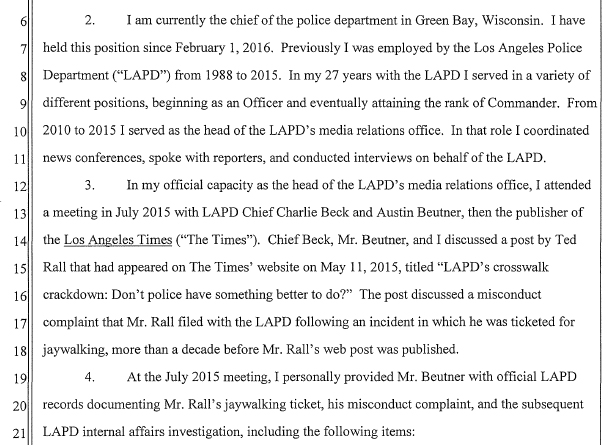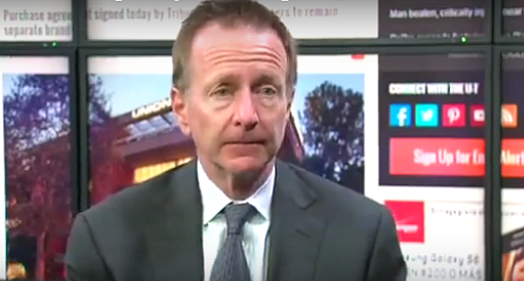Thanks to my lawsuit, we know that the LAPD asked the LA Times to fire me as a favor to the cops because I was constantly criticizing them and their police chief. But, as Sartre said, individual actions require accountability. In that spirit, here’s a rogues gallery of the principal players and their roles in the conspiracy behind my firing last July.
LAPD Police Chief Charlie Beck
Until a few months ago, when the LA Times was forced to submit affidavits in their defense to my lawsuit for wrongful termination and defamation, Beck’s role was unknown. In multiple articles, the Times was too cute by half, claiming that they had received the sketchy audiotape and the dubious documents from the LAPD. As the following evidence shows, however, the police chief took a break from fighting crime and beating up black people to walk over to the LA Times to complain about my cartoon and accompanying blog in which I described having been roughed up by an LAPD officer who arrested me for jaywalking in 2001:
They say that law-enforcement officers like him work in order to protect our freedoms. But Beck obviously never heard of the First Amendment. The First Amendment doesn’t really protect free-speech as broadly as similar statutes do in other countries, but the one thing that it does do is prevent government agencies – like the LAPD – from interfering with journalism and criticism. Beck hates the Constitution; he is un-American.
If there’s any justice, Beck will soon resign. He and the Times are claiming that he raided the LAPD evidence locker and gave the material to the paper. If that’s true, he should go. However, it looks like he’s lying. Most likely, he got the stuff from the arresting officer’s personal files. Which means that he lied about the stuff being official evidence. In that case too, he should go.
LA Times Ex-Publisher Austin Beutner
As far as I can tell, Beutner is even more stupid than he is evil. And he is evil.
The billionaire who made his bucks raping the former Soviet Union in the 1990s is the guy at the Times who took the meeting with the police chief about little old me. The LAPD police union, the LAPPL, was a major political ally for him, so he kind of had to. However, he also should’ve thought about journalistic ethics. The last thing that the publisher of the paper that covers the police should be doing is hanging out with them. And the very last thing that he should be doing is hanging out with a guy who is asking him to fire one of the cops’ critics.
The reason I say he’s stupid is because it never occurred to him that he might be getting played by the police chief. He took Beck at face value. He wasn’t careful. He just accepted the evidence the cops gave him, handed it over to his editorial page editor, and ordered him to fire me. At least that’s how it looks right now. We’ll learn more during the discovery phase of the pre-trial.
If he’d been a journalist, or knew anything about journalism, or had any common sense, it might’ve occurred to him that the chief of police had a vested interest in getting rid of a cartoonist who keeps making fun of the chief of police. Of course, that would’ve also interfered with his own interest. After all, he was too cozy with the police to say no.
The paper let him go after I was fired.
LA Times Editorial Page Editor Nick Goldberg
Goldberg, the editor of the editorial pages, was a guy I barely had anything to do with. He wasn’t my usual editor. But he supervised my usual editors. He got the order to fire me from Beutner.
Now back in the day, when I started out, if a publisher had asked an editor to do something like this, to fire someone on the flimsiest of evidence, evidence that hadn’t been properly evaluated or analyzed or authenticated, evidence that really didn’t show much at all, said editor would have told said publisher to fuck himself. Probably would’ve resigned. But that’s not what Goldberg did.
Like many newspapermen nowadays, Goldberg was terrified. Most of his colleagues have been laid off. All he wanted to do was to keep his head down long enough to retire. So he was a wimp. When Beutner ordered him to let me go, he said yes sir. Without letting me talk to my editors. And not only that. He signed my death warrant. He signed the first article, the “a note to readers” intended to end my journalistic career.
Within days, Goldberg had in his hand solid proof that everything he had written was untrue. That he had lied for the cops. Even then, he kept quiet. No retraction. No resignation letter. He’s still there, drawing a six-figure salary despite his utter lack of decency.
LA Times Readers Representative Deirdre Edgar
Deirdre Edgar seems like a relatively obscure figure in this whole fiasco. Actually, she’s very important. She wrote the second hit piece against me, the one that came out three weeks after the paper found out that I have been telling the truth and that the cops have been lying about me.
Ironically, she’s the so-called “Readers representative” – the equivalent of an ombudsman at other newspapers. She’s the person who supposed to stand up for journalistic ethics. In fact, when the paper rewrote their ethical guidelines back in 2014, she got the byline.
The irony is that among other things, those ethical guidelines require reporters to give equal time to the subjects of critical articles in order to respond. She didn’t do that. Never called. Never wrote. The same guidelines say that the reporter should meet in person with the subject of a critical article. She didn’t try to do that. There’s other stuff too. Like, you’re not supposed to willfully lie about the subject of an article. Which she did.
LA Times Editor/Publisher Davan Maharaj
Maharaj was the editor-in-chief when all this went down last year. His role at the time remains obscure. Tribune Publishing decided to name him the new publisher after they fired Beutner.
Whatever his role last summer, he has been at the helm since early fall 2015. All the time, he has allowed those two libelous articles about me to remain on the newspaper’s website. This, of course, despite the fact that the information inside them is false and everyone knows they’re false. If this guy had an ounce of integrity, he would resign.
Support free speech! Fight the LA Times’ demand that I pay them $75,000: gofundme.com/tedrall







15 Comments.
Why is it that when I look at these mugshots I am reminded of certain mobsters portrayed in “The Godfather” series of movies? 🙁
«If there’s any justice, Beck will soon resign.» As Aristotelian logic teaches us, this implies that if Mr Beck doesn’t resign, there is no justice. Quelle surprise !…
Henri
> As Aristotelian logic teaches us, this implies …
An interesting statement coming from a self-professed student of logic. Aristotelian logic has no concept of ‘implication’ whatsoever.
That said, I do believe that you are more or less correct in your conclusion, tanj it all anyway.
«Aristotelian logic has no concept of ‘implication’ whatsoever. » An interesting statement, CrazyH ; my impression is that most modern logicians consider the Aristotelian syllogism as a kind of implication, but sometimes differ as to just what kind of implication it represents. To take on famous example, if we accept the major premise that all men are mortal, than the minor premise that Sokrates is a man implies that Sokrates is mortal….
But I could, of course, be wrong….
Henri
Just replace “implies” with “leads to the conclusion” in all examples — problem solved.
😀
> But I could, of course, be wrong….
You are, but I’m willing to give you the benefit of the doubt under the assumption that you are not a native English speaker, or perhaps have read the relevant texts in some other language. (I could be wrong 😉
To “imply” is to insinuate or suggest, it is not an absolute; whereas a conclusion reached via (valid) syllogism is an absolute, as with your example above. (which is also verifiable by observing that Socrates is dead.)
Thank you for kindness in taking into account my lack of linguistic knowledge, CrazyH ; I fear, however, that it is you who misunderstands the way the term «implication» is used in logic….
But as I said, I could be wrong….
Henri
You may be thinking of ‘infer’ – many native speakers confuse the two terms. Modern logicians do speak of inference, but they differentiate that from Aristotelian logic.
Contrary to Doyle’s description, Holmes did not use deduction, but rather inductive inference to reach his conclusions. Yet by some strange coincidence, he was never wrong…
This appears to be much ado about nothing, the point of which I fail to see.
According to the website indicated below, the definition of IMPLY is “3.
(logic) to enable (a conclusion) to be inferred”
http://www.dictionary.com/browse/implies
Now, kiss & make up. 😀
No tongue.
😀 😀 😀 😀 😀
Or, in a little more detail, mein verehrter Lehrer, the exposition found here. But of course, the (presumably) native speakers responsible for this definition may have been unaware of the fine distinction between inference and implication…. 😉
Henri
@mhenriday —
I ain’t got a dog in this fight.
I understood perfectly well your original post.
🙂
Henri, my man – you really need to learn when to cut your losses.
While your OP may have been an obscure formal usage of “imply” (not “implication”), your subsequent argument shows that you really don’t understand something that is an important distinction to someone who has been “trained in logic.”
(It’s also an important distinction to someone with your ostensible vocabulary.)
Aristotelian Logic:
No person who is trained in logic conflates ‘imply’ and ‘prove’
Henri is a person who conflates ‘imply’ and ‘prove’
Ergo, Henri is not a person who is trained in logic.
Inductive Inference:
Henri used the word “Aristotelian” in his OP to imply that he is more familiar formal logic than he actually is.
It’s not the first time I’ve observed you using a five dollar word when a fifty cent one would work just as well; and in such a way as to call into question whether you are truly familiar with the subject matter. (Nor am I the first to point it out on this forum.)
If you were a member of the opposition, I would now subject you to mockery and scorn. Yet, in spite of our occasional petty bickering, I consider you an ally. So please take this as friendly advice.
Using five dollar words may impress the rubes, but it can have the opposite effect when you are talking to someone with a little more education. It terms of debate, it is a red herring. It does nothing to prove your point nor disprove your opponent’s.
I believe you are a bright guy, you don’t need to put on airs. You arguments would be stronger without them.
Once again, CarzyH, you demonstrate your propensity to talk about matters that you simply don’t grasp, like Aristotelian logic or the concept of of logical implication. I can understand why you would wish others to «cut [their] losses», I e, refrain from correcting your misunderstandings, but rest assured that I don’t intend to leave the field. You started this interchange with a comment that merely revealed your ignorance – «Aristotelian logic has no concept of ‘implication’ whatsoever » (followed by a gratuitous comment on your humble interlocutor’s linguistic inadequacies), now we shall have to see where it ends up…. 😉
Henri